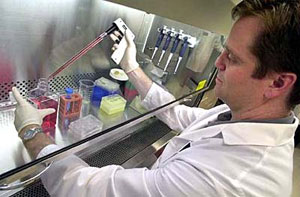Molecular Biologist
Tasks & duties

Molecular biologists may do some or all of the following:
-
test for disease-causing organisms and inherited human genetic disorders
-
study the detailed genetic makeup of plants, animals, humans, bacteria and fungi
-
work to modify the genetic makeup of microorganisms, plants or animals
-
develop new lines of plants, animals or microorganisms, or develop existing varieties
-
write and publish reports on experiments and present findings at conferences
-
prepare funding grants and proposals
-
teach molecular biology or genetics
Skills & knowledge

Molecular biologists need to have:
-
knowledge of biochemistry, microbiology, and molecular biology
-
the ability to analyse and interpret research results
-
knowledge of how genetic information is carried by genes, chromosomes and DNA
-
the ability to perform experiments and operate scientific equipment
-
writing skills
-
maths and computer skills
Entry requirements
To become a molecular biologist you need to have a New Zealand Certificate in Science or a Bachelor of Science. Postgraduate qualifications and lab experience are helpful for higher level positions.
Secondary education
A tertiary entrance qualification is needed to enter further training. Preferred subjects include maths, chemistry and biology up to Year 13.
Tertiary education
Molecular biologists can move into different types of positions depending on their level of education. At entry level, those with a Certificate in Science, a Bachelor of Science, a Bachelor of Biomedical Science or a Bachelor of Science and Technology typically work as lab technicians, assisting other scientists with research projects.
Honours, Masters and PhD graduates usually work as research scientists or project leaders, and are more likely to have independent research goals and more responsibility over their projects.
Some students combine molecular biology with other study areas, such as business, law or technology, to prepare for careers in medical sales, patent law or biotechnology.
Training on the job
Further skills, such as learning new scientific techniques and science-based software packages, are gained on the job. Molecular biologists also fine tune their report writing and presentation skills.
They may also attend management courses to help them lead projects and teams.
Useful experience
Useful experience for molecular biology students includes a studentship or short-term lab experience during holidays. This practical experience is favoured by employers and gives you a chance to work out what areas you're interested in. Contact university science faculties or Crown Research Institutes to learn what opportunities may be available.
Related courses
Biochemistry and Cell Biology
Environmental Health
Microbiology
Pharmacology
Document Actions
